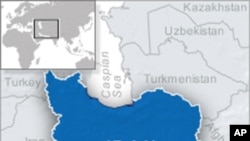Iranian officials are insisting a recently implemented program of subsidy cuts has met no major opposition and the public is adapting well to the measures. But Iranian workers, from various professions, say they are having trouble coping with the cuts.
Iranian government officials say their economy is doing well and subsidy cuts on key items like gasoline, bread, natural gas and water are going down well with the public.
The head of Iran’s Transportation and Fuel Administration, Mohammed Rouhanian, says cuts on gasoline subsidies have provided a substantial savings for the government.
He says gasoline consumption has dropped dramatically in the days following the implementation of subsidy cuts, creating greater efficiency in the transport industry and significant savings to the country.
But many ordinary Iranians complain the subsidy cuts are making their lives extremely difficult. A 65-year-old truck driver from Tehran, who gave his name as Hassan, broke into tears as he described his plight.
He says he is an old man and cannot make ends meet with the price increases. He says that everybody in Iran is unhappy about the economic crisis, but that government officials are not listening… He says the government "lies, lies, lies and lies" to the people to stay in power.
Another Iranian man, who asked not to give his name, also complained about price rises and insisted the Iranian government is not telling the truth.
He says there is misery and unemployment all around and it gets worse every day. He also accuses the government of not telling the truth over price increases. He claims government officials are trying to blind the people with the stories they tell.
One Iranian businessman says the government is ruining local industry.
He complains Iran is secretly importing everything from toothpicks to cotton ear swabs from China. He says the imports are killing local industry and Iranians are becoming miserable because local industry is dying. People, he adds, are losing their livelihoods and going broke.
Political scientist Houchang Hassanyari, of Canada’s Royal Military College, notes the rise in gasoline prices will create a ripple effect.
He says in one or two days, the price of taxi fare is going up and that will add even more to the hardship. He adds that the other point is you might see very long lines for gas, so the jump in prices is extremely bad for the vast majority of people.
During her recent visit to the Gulf, U.S. Secretary of State Hillary Clinton said Iran is constantly trying to evade the impact of U.N. nuclear sanctions, which many economists say have forced the Iranian government to reduce subsidies and public consumption.
Hassanyari says he thinks most Iranians do not hold the the West responsible for their economic hardships because they understand Iran’s leaders have incurred those sanctions over Tehran’s nuclear program.
Government Subsidy Cuts Pinch Iranian Workers




